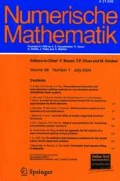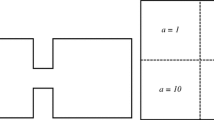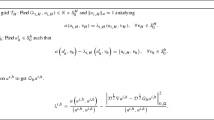Abstract
A refined a posteriori error analysis for symmetric eigenvalue problems and the convergence of the first-order adaptive finite element method (AFEM) is presented. The H 1 stability of the L 2 projection provides reliability and efficiency of the edge-contribution of standard residual-based error estimators for P 1 finite element methods. In fact, the volume contributions and even oscillations can be omitted for Courant finite element methods. This allows for a refined averaging scheme and so improves (Mao et al. in Adv Comput Math 25(1–3):135–160, 2006). The proposed AFEM monitors the edge-contributions in a bulk criterion and so enables a contraction property up to higher-order terms and global convergence. Numerical experiments exploit the remaining L 2 error contributions and confirm our theoretical findings. The averaging schemes show a high accuracy and the AFEM leads to optimal empirical convergence rates.
Similar content being viewed by others
References
Ainsworth, M., Oden, J.T.: A posteriori error estimation in finite element analysis. In: Pure and Applied Mathematics. Wiley-Interscience, New York (2000)
Alberty J., Carstensen C., Funken S.A.: Remarks around 50 lines of Matlab: short finite element implementation. Numer. Algorithms 20(2–3), 117–137 (1999)
Alberty J., Carstensen C., Funken S.A., Klose R.: Matlab implementation of the finite element method in elasticity. Computing 69(3), 239–263 (2002)
Babuška, I., Osborn, J.: Eigenvalue problems. In: Handbook of Numerical Analysis, vol II, pp. 641–787. North-Holland, Amsterdam (1991)
Babuška I., Osborn J.E.: Finite element-Galerkin approximation of the eigenvalues and eigenvectors of selfadjoint problems. Math. Comput. 52(186), 275–297 (1989)
Bangerth W., Rannacher R.: Adaptive finite element methods for differential equations. Lectures in Mathematics ETH Zürich. Birkhäuser Verlag, Basel (2003)
Brenner, S.C., Scott, L.R.: The mathematical theory of finite element methods. In: Texts in Applied Mathematics, vol. 15, 3rd edn. Springer, New York (2008)
Carstensen C.: An adaptive mesh-refining algorithm allowing for an H 1 stable L 2 projection onto Courant finite element spaces. Constr. Approx. 20(4), 549–564 (2004)
Carstensen C.: All first-order averaging techniques for a posteriori finite element error control on unstructured grids are efficient and reliable. Math. Comput. 73(247), 1153–1165 (2004)
Carstensen C.: A unifying theory of a posteriori finite element error control. Numer. Math. 100(4), 617–637 (2005)
Cascon J.M., Kreuzer C., Nochetto R.H., Siebert K.G.: Quasi-optimal convergence rate for an adaptive finite element method. SIAM J. Numer. Anal. 46(5), 2524–2550 (2008)
Chatelin F.: Spectral approximation of linear operators. Computer Science and Applied Mathematics. Academic Press, New York (1983)
Durán R.G., Padra C., Rodríguez R.: A posteriori error estimates for the finite element approximation of eigenvalue problems. Math. Models Methods Appl. Sci. 13(8), 1219–1229 (2003)
Giani S., Graham I.G.: A convergent adaptive method for elliptic eigenvalue problems. SIAM J. Numer. Anal. 47(2), 1067–1091 (2009)
Heuveline V., Rannacher R.: A posteriori error control for finite approximations of elliptic eigenvalue problems. Adv. Comput. Math. 15(1–4), 107–138 (2001)
Knyazev A.V.: New estimates for Ritz vectors. Math. Comput. 66(219), 985–995 (1997)
Knyazev A.V., Osborn J.E.: New a priori FEM error estimates for eigenvalues. SIAM J. Numer. Anal. 43(6), 2647–2667 (2006)
Larson M.G.: A posteriori and a priori error analysis for finite element approximations of self-adjoint elliptic eigenvalue problems. SIAM J. Numer. Anal. 38(2), 608–625 (2000)
Larsson, S., Thomée, V.: Partial differential equations with numerical methods. In: Texts in Applied Mathematics, vol. 45. Springer, Berlin (2003)
Mao D., Shen L., Zhou A.: Adaptive finite element algorithms for eigenvalue problems based on local averaging type a posteriori error estimates. Adv. Comput. Math. 25(1–3), 135–160 (2006)
Raviart P.A., Thomas J.M.: Introduction à l’analyse numérique des équations aux dérivées partielles. Collection Mathématiques Appliquées pour la Maî trise. Masson, Paris (1983)
Sauter S.: hp-finite elements for elliptic eigenvalue problems: error estimates which are explicit with respect to λ, h, and p. SIAM J. Numer. Anal. 48(1), 95–108 (2010)
Strang G., Fix G.J.: An Analysis of the Finite Element Method. Prentice-Hall, Englewood Cliffs (1973)
Verfürth R.: A Review of A Posteriori Error Estimation and Adaptive Mesh-Refinement Techniques. Wiley and Teubner, New York (1996)
Walsh T.F., Reese G.M., Hetmaniuk U.L.: Explicit a posteriori error estimates for eigenvalue analysis of heterogeneous elastic structures. Comput. Methods Appl. Mech. Eng. 196(37–40), 3614–3623 (2007)
Author information
Authors and Affiliations
Corresponding author
Additional information
Supported by the DFG Research Center MATHEON “Mathematics for key technologies” in Berlin and the Hausdorff Institute for Mathematics in Bonn, Germany.
Rights and permissions
About this article
Cite this article
Carstensen, C., Gedicke, J. An oscillation-free adaptive FEM for symmetric eigenvalue problems. Numer. Math. 118, 401–427 (2011). https://doi.org/10.1007/s00211-011-0367-2
Received:
Published:
Issue Date:
DOI: https://doi.org/10.1007/s00211-011-0367-2




